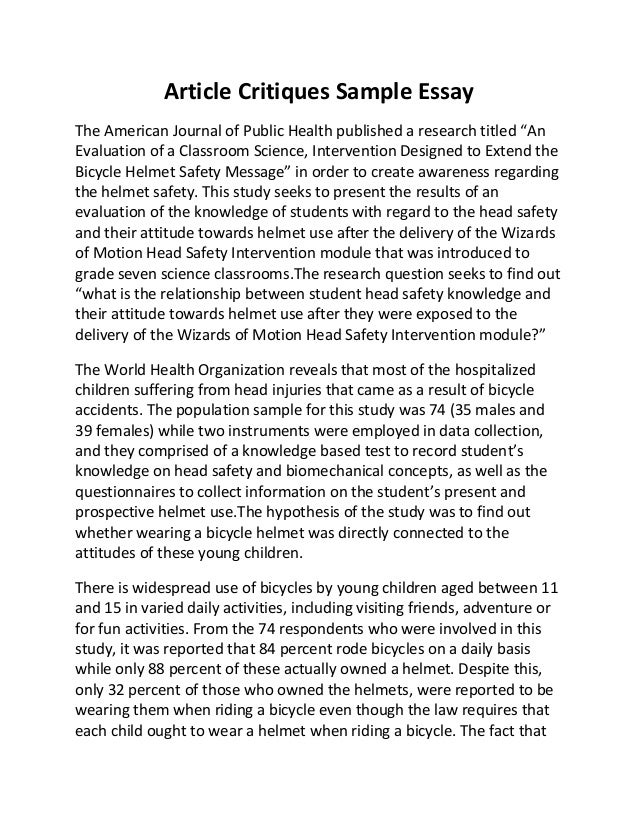
Writing a Literature Review. A literature review is a document or section of a document that collects key sources on a topic and discusses those sources in conversation with each other (also called synthesis).The lit review is an important genre in many disciplines, not just literature (i.e., the study of works of literature such as novels and plays) How To Write A Discussion Paper Essay - WRITING A SCIENTIFIC RESEARCH ARTICLE. The next big step is writing a scientific Discussiob. It is the last part of your paper, in which you summarize your findings in light of the current literature. You also need to zero in on how your work will move the field forward and what questions remain Oct 12, · A literature review is a summary of studies related to a particular area of research. A literature review is used in the introduction and discussion of your manuscripts. It is important to note that there are differences in how literature reviews should be presented in each section
Writing a Literature Review // Purdue Writing Lab
If the discussion section is about "So what," then what is the conclusion meant for? Asked by akriti saxena on 18 Oct, There are two aspects to your question: what goes into the Discussion section of an article and what is the difference between the Discussion and conclusion sections. The Discussion section of an article, as the name suggests, is meant to discuss the results of the study with respect to the problem of the study.
Thus, you need to address points such as the following:. For more information on writing the Discussion section, you may refer to these resources:. The conclusion is typically a part the last part of the Discussion section, how to write discussion in review article. You need to provide a short summary of your findings and its meaning for your broad research area.
Most journals do not require a separate section for the conclusion. For those that do, you need to write this under a separate heading. For more information on writing the conclusion, you may refer to these resources:. Answered by Editage Insights on 24 Oct, This content belongs to the Manuscript Writing Stage. Translate your research into a publication-worthy manuscript by understanding the nuances of academic writing. Subscribe and get curated reads that will help you write an excellent manuscript.
Confirm that you would also like to sign up for free personalized email coaching for this stage. Recommended Courses. Q: What should be written in the Discussion section of an article? Answer Follow this Question. Answer: There are two aspects to your question: what goes into the Discussion section of an article and what is the difference between the Discussion and conclusion sections. Thus, how to write discussion in review article, you need to address points how to write discussion in review article as the following: What do the results mean for the problem and hypothesis of the study?
What are the implications for the target population? How do the findings add to the current literature which you would have included in the Background section when writing about the literature review?
What are the gaps, if any, you found in your study after evaluating the results? Are there any suggestions for how to write discussion in review article research? For more information on writing the Discussion section, you may refer to these resources: How to write the Discussion section in a qualitative paper? The secret to writing the results and discussion section of a manuscript The conclusion is typically a part the last part of the Discussion section.
For more information on writing the conclusion, you may refer to these resources: In a manuscript, are the Discussion and Conclusion sections the same? Tips for writing the perfect IMRAD manuscript. Answered by Editage Insights on 24 Oct, Resources for authors and journals. Upvote this Answer Comment.
Answer this question. Ask a new question. This content belongs to the Manuscript Writing Stage Translate your research into a publication-worthy manuscript by understanding the nuances of academic writing. No Yes. Show comments. Follow this Question.
Trending Searches Statement of the problem COVID Background of study Scope of the study Types of qualitative research Rationale of the study Concept paper Literature review Introduction in research Under "Editor Evaluation" Ethics in research. Recent Searches Review paper Responding to reviewer comments Predatory publishers Scope and delimitations Open access Plagiarism in research Journal selection tips Editor how to write discussion in review article Types of articles "Reject and Resubmit" status Decision in process Conflict of interest.
Journal Publication. Jayashree Rajagopalan. LEARNING TIME. How to avoid retractions and publish…. Editage Insights. Show all.
How to write a review paper? Learn from the Scratch. Know about benefits of a review.
, time: 6:46How to Write an Article Review (with Sample Reviews) - wikiHow

Mar 18, · Think of your discussion as an inverted pyramid. Organize the discussion from the general to the specific, linking your findings to the literature, then to theory, then to practice [if appropriate]. Use the same key terms, narrative style, and verb tense [present] that you used when describing the research problem in your blogger.com by: 1 Dec 08, · Open your article review by citing the article, then write an introduction which states the article’s thesis. Next, summarize the article, followed by your opinion about whether the article was clear, thorough, and useful. Finish with a paragraph that summarizes the main points of the article and your opinions%() Writing a Literature Review. A literature review is a document or section of a document that collects key sources on a topic and discusses those sources in conversation with each other (also called synthesis).The lit review is an important genre in many disciplines, not just literature (i.e., the study of works of literature such as novels and plays)
No comments:
Post a Comment